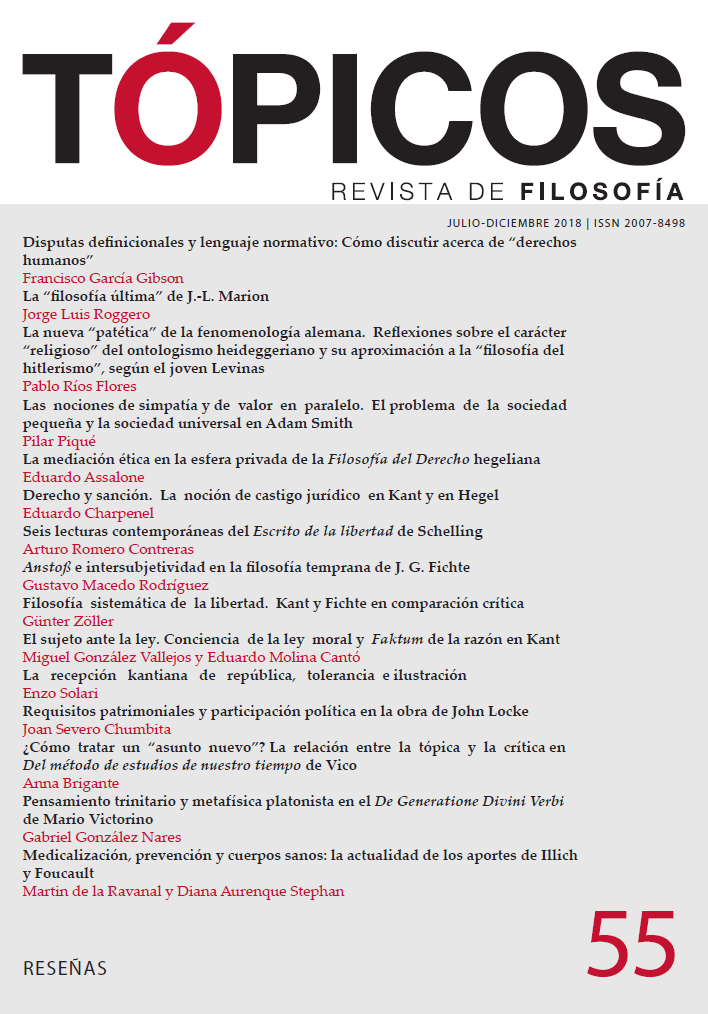Publicado 2018-06-08
Palabras clave
- Kant,
- Hegel,
- idealismo alemán,
- filosofía del derecho,
- filosofía de la ley
- castigo legal,
- retributivismo,
- filosofía política. ...Más
Cómo citar
Resumen
En este artículo realizo una comparación de las teorías del castigo legal en la filosofía del derecho de Kant y de Hegel. La tesis que busco defender es que, al menos en lo que concierne a este tópico, las posiciones de Kant y de Hegel no deberían leerse en franca oposición, sino como pertenecientes a una familia común de teorías penales retributivistas. El análisis comparativo que presento busca arrojar luz sobre ciertos aspectos estructurales de su filosofía del derecho como un todo y sobre algunas estrategias habituales en ellos en su procedimiento de justificación jurídico-filosófica. La discusión que aquí se presenta mostrará, no obstante, algunas limitaciones de ambas teorías y esbozará a grandes rasgos, a modo de solución a dichas dificultades, una lectura en la cual las concepciones filosóficas de Kant y de Hegel en torno al castigo legal son más bien consideradas como complementarias.
Referencias
- Bibliografía
- Cesare Beccaria, De los delitos y las penas, Madrid, Alianza, 2014.
- Clayton Bohnet, Logic and the Limits of Philosophy in Kant and Hegel, Londres, Palgrave Macmillan, 2015.
- B. Sharon Byrd, “Kant’s Theory of Punishment: Deterrence in its Threat, Retribution in its Execution”, Law and Philosophy, no. 8 (2), 1989.
- B. Sharon Byrd y Joachim Hruschka, Kant’s Doctrine of Right. A Commentary, Cambridge, Cambridge University Press, 2010.
- D.E. Cooper, “Hegel’s Theory of Punishment”, en Z. A. Pelczynski (ed.), Hegel’s Political Philosophy. Problems and Perspectives, Cambridge, Cambridge University Press.
- Samuel Fleischacker, Kant’s Theory of Punishment, Kant Studien, no. 79, 1988.
- Eckart Förster, Die 25 Jahre der Philosophie, Frankfurt, Klostermann, 2012.
- G.W.F. Hegel, Grundlinien der Philosophie des Rechts, Frankfurt, Suhrkamp, 1986.
- G.W.F. Hegel, Vorlesungen über die Philosophie der Geschichte, Frankfurt, Suhrkamp, 1986.
- G.W.F. Hegel, Principios de la filosofía del derecho, Juan Luis Vermal (trad.), Barcelona, Edhasa, 2005.
- Dietrich Henrich (ed.), Kant oder Hegel? Formen der Begründung in der Philosophie, Stuttgart, Kett-Clotta, 1983.
- Thomas Hobbes, Leviathan, Cambridge, Cambridge University Press, 2003.
- Stephen Houlgate, “Hegel’s Ethical Thought”, Bulletin of the Hegel Society of Great Britain, no. 25, 1992.
- Immanuel Kant, Metaphysische Anfangsgründe der Rechtslehre, Hamburg, Felix Meiner, 2009.
- Immanuel Kant, Metafísica de las costumbres, Adela Cortina Orts y Jesús Conill Sancho (trads.), Madrid, Tecnos, 2005.
- Immanuel Kant, “Metaphysik der Sitten Vigilantius”. En: Gesammelte Schriften XXVII (2,1), Berlín, Walter de Gruyter, 1975.
- Dudley Knowles, Hegel and the Philosophy of Right, Londres y Nueva York, Routledge, 2002.
- Mary Margaret Mackenzie, Plato on Punishment, Berkeley y Los Ángeles, University of California Press, 1981.
- Georg Mohr, “Unrecht und Strafe (§§82-104)”, en Ludwig Siep (ed.), G.W.F. Hegel. Grundlinien der Philosophie des Rechts, Berlín, Akademie Verlag, 1997.
- Leslie A. Mulholland, Kant’s System of Rights, Nueva York, Columbia University Press, 1990.
- Thomas Pogge, “Is Kant’s Rechtslehre a ‘Comprehensive Liberalism’”, en Mark Timmons (ed.), Kant’s Metaphysics of Morals. Interpretative Essays, Oxford, Oxford University Press.
- Paul Ricoeur, Lo justo, Agustín Domingo Moratalla (trad.), Sevilla, Caparrós Editores, 2003.
- Sally Sedgwick, The Reception of Kant’s Critical Philosophy. Fichte, Schelling, and Hegel, Cambridge, Cambridge University Press, 2000.
- Sally Sedgwick, Hegel’s Critique of Kant. From Dichotomy to Identity, Oxford, Oxford University Press, 2012.
- Arthur Shuster, “Kant on the Role of the Retributive Outlook in Moral and Political Life”, The Review of Politics, no. 73, 2011.
- Robert Stern, Understanding Moral Obligation. Kant, Hegel, and Kierkegaard, Cambridge, Cambridge University Press, 2012.
- Mark Tunick, Punishment. Theory and Practice, Berkeley y Los Ángeles, University of California Press, 1981.
- Alejandro Vigo, “Ética y derecho según Kant”, Tópicos, 41, 2011.
- Allen W. Wood, Hegel’s Ethical Thought, Cambridge, CUP, 1990.






